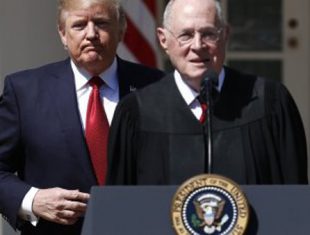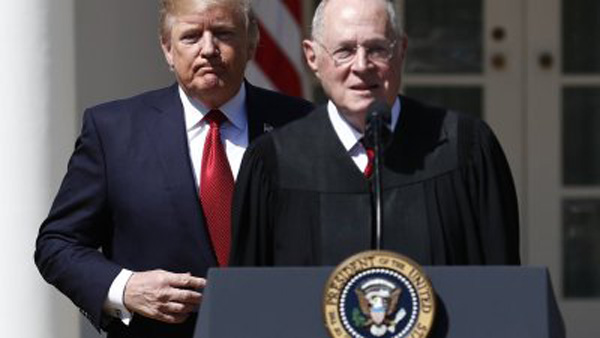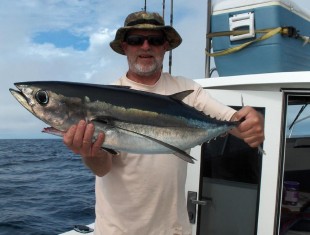Editor’s note: This was found on the Internet and was so interesting we are sharing it here.
Legal Expert Goes Public on Trump-Kennedy: “No one is telling the full story…so I’m going to do so now”
DONALD TRUMP AND ANTHONY KENNEDY
By
Published on July 11, 2018
While conservatives are jumping for joy at the thought of a the most right-wing Supreme Court in history swinging even more to the right with Donald Trump’s pick for the vacant seat, progressives are outraged over not only the hypocrisy from congress so eagerly confirming the pick when they refused to confirm Obama’s nominee in 2016, but also because stories are emerging of some shady dealings to get Trump this pick.
And the shady dealings may have come directly from retiring Justice Anthony Kennedy and Donald Trump himself, as the two have known each other for a long time.
Not only have they known each other, Kennedy’s son was basically Trump’s banker at DeutscheBank and loaned billions of dollars to Trump. Oh, also, DeutscheBank was under investigation for money laundering to Russia at the same time Trump was running for President.
Seth Abramson puts together the whole case in this Twitter thread:
1/ Trump’s acceptance of a Federalist Society list of acceptable SCOTUS nominees—a list (remember this) with *20 names* on it—is what won him the presidency. Don’t take my word for it; that’s what *everyone* says about how Trump built a winning coalition. (Source)
2/ What no one discussed in the presidential campaign—and what neither Trump nor Kennedy ever spoke of, despite the fact that Kennedy was the most likely Justice to retire, so his intention and willingness to retire was nationally significant—was that the two men knew each other.
3/ Strange, isn’t it? That Trump made SCOTUS a major campaign issue, but never mentioned how and to what extent he knew the Justice most likely to retire? Especially given that Justices tend to choose the timing of their retirement on the basis of their view of the sitting POTUS?
4/ Well, we now know *why* Trump wouldn’t have wanted to mention anything—or Kennedy. And incredibly, the answer is: Russia. Kennedy’s son worked for Deutsche Bank, which during the presidential campaign was being investigated for laundering Russian money. (Source)
5/ The other problem: Kennedy’s son was Trump’s *banker*. He worked at Deutsche Bank, loaning Trump lots of money before—possibly as—Deutsche Bank began to be investigated for laundering Russian money and Russia stood accused of interfering in the US election (from June 2016 on).
6/ So *any* reference made—by Kennedy *or* Trump—to the fact they knew each other ran the risk of raising the DB connection at a time Trump was hiding his tax returns (through the fraudulent claim an audit precluded releasing them) and the DB-Russia scandal was political cyanide.
7/ So Trump, who has *no* filter in public speeches or debates, forewent speaking much about upcoming retirements, despite him knowing *personally* the man most likely to retire (and Trump *loves* talking about who he knows and how who he knows helps him).
8/ But now we know the *truth*—Kennedy’s son wasn’t just Trump’s banker, he actually oversaw Trump getting ONE BILLION in loans at a time American banks wouldn’t loan to Trump and his overall net worth may well have been *south* of that one-billion figure. (source)
9/ So process this: Trump’s 20-person SCOTUS list was critical to his victory; he knew personally the man that list would be used to replace; he couldn’t discuss how he knew that man, as it’d lead to pre-election stories involving questionable loans, Russia, and money laundering.
10/ It was in this context that—within his first months as president—Trump began to engage in unprecedented secret negotiations with his banker’s dad about what it would take to get him (Kennedy) to retire. Again, Trump—who’ll boast of anything and everything—kept this a secret.
11/ Trump likely kept it secret for two reasons: (1) he was under more heat than ever over Russia, making news stories about questionable loans to him from a Russian-money-laundering bank incredibly dangerous; (2) he knew—as did Kennedy—that negotiations of this sort were wrong.
12/ It’s common for SCOTUS Justices to decide—privately and personally, in consultation with family and (sometimes) close friends—when they’ll retire on the basis of who occupies the White House. But clandestine negotiations between a Justice and sitting president are different.
13/ But here’s the thing: Justice Kennedy’s clandestine negotiation with Trump wasn’t just politically charged collusion across two branches of government, as the arrangement the two men made, as reported today by NBC, was something quite different—it was a secret *quid pro quo*.
14/ Kennedy gave Trump a list of 5 names—*none of whom were on the list Trump promised voters he’d select Justices from*—and apparently said he’d only retire if Trump nominated someone on the list. As Trump’s original list was political, Kennedy’s demands were likewise political.
15/ What Justice Kennedy was doing was inserting himself directly into a hot-button political issue that had been at the center of Trump’s presidential campaign—and he was doing so as part of a negotiation both he and the White House were keeping a secret from American voters.
16/ By the time Trump had been in office nine months, he was ready to *violate his campaign promise* of picking from the Federalist Society list—though again, he had to hide from the media and voters what he was going to do and why. So he went to Fox News.
17/ Fox News got the exclusive via the White House, and dutifully reported the *false story* that “no one” in or outside the White House knew when Kennedy would retire but it was “widely” expected he would, perhaps as soon as Thanksgiving—an overstatement *very* helpful to Trump.
18/ It’s important to note that all Trump told even FNC was that he was expanding the Federalist Society list—*not* that he was now obligated by a pact with Kennedy to *only* select from the additions, none of had been originally selected (pre-election) by the Federalist Society.
19/ This is why one detail in the FNC story is key: Trump sent White House Counsel Don McGahn to the Federalist Society to talk to them. What was said at that meeting? What was said or done to ensure the Federalist Society would *keep quiet* about Trump’s broken campaign promise?
20/ We don’t know what the Federalist Society knew about the unethical Trump-Kennedy pact. But here’s the more important point: we don’t know what former Kennedy clerk Brett Kavanaugh knew about the existence of Kennedy’s secret list. Did he know what Kennedy and Trump had done?
21/ What’s clear is that—*though Kennedy told Trump he had to name one of the 5 names on the list to get Kennedy to retire*—Trump *rejected* 4 of the 5 names. NBC reported today that Trump rejected the four because they weren’t conservative enough—but there’s a problem with that.
22/ Keep in mind—before I point out the blindingly obvious problem with today’s NBC report—that Trump knew what he was doing was extraordinary, unethical, had to remain secret, and could define his presidency. So rejecting 4 of the 5 names Kennedy gave him was *very* headstrong.
23/ But even more bizarre than Trump rejecting 4 of the 5 names early on—and thus risking Kennedy’s ire—was that his administration would *lie to the American people yet again* by saying that the four names rejected weren’t conservative enough. Because that lie’s *easily* caught.
24/ One of the names Kennedy gave Trump—in addition to ’s—was apparently Amy Coney Barrett, who is so clearly more conservative than Kavanaugh that only *every single conservative commentator* has said so, as well as every GOP pol willing to speak on the record about it.
25/ So why would the Trump administration put out the story that it considered Barrett not conservative enough—when that’s clearly untrue? The answer to that question is the answer to this entire mystery, but before I get there I need to make a note about Senator Mitch McConnell.
26/ Trump’s pact with Kennedy was *so* secretive he even kept it from the Senate Majority Leader—underscoring how wrong Trump (and we can be sure—given his superior moral standing—Kennedy) knew it was. We know McConnell was in the dark due to something he recently said to Trump.
27/ Just before Trump announced Kavanaugh, McConnell said to him that he couldn’t guarantee there were enough votes in the Senate to confirm Kavanaugh—though he believed there were enough to confirm Kethledge or Hardiman. McConnell’s statement is now *historically* extraordinary.
28/ McConnell—a deal-maker who can get anything done, but who oversees a 50-49 Congress where 50 votes are needed to confirm a SCOTUS nominee—was telling Trump that he couldn’t hold his caucus together to get Kavanaugh confirmed. And Trump *ignored him*. It may be unprecedented.
29/ So Trump lies about Barrett; ignores McConnell; lies to America by saying he’s going through a vetting process when he’s actually not; and keeps his clandestine negotiations with Kennedy a secret from everyone except—perhaps—higher-ups at the Federalist Society and Kavanaugh.
30/ What explains this *bizarre* behavior? These risky lies? Violating a core campaign promise? Exposing Kennedy to accusations of unethical conduct? It’s simple: Brett Kavanaugh had written in 2009 that a president should be exempt from *civil suits and criminal investigations*.
31/ We know from major-media reports that Team Trump was focused on Kavanaugh’s 2009 article in the Minnesota Law Review. And we know from his personal and political history that Trump actually doesn’t care about abortions—he cares about not being impeached or indicted in office.
32/ Donald Trump is 72 years old and in poor health—however he got the White House doctor to spin it. If he can evade criminal investigation for the entirety of his presidency, he has a chance to be “safe” until January 20, 2025. He’ll be pushing 79 by then—and that fact matters.
33/ Any prosecution of a former president will take years, during which we could assume Trump—given his money and inability to melt into a populace at home or abroad—would be free. So if he can forestall a criminal probe until his post-presidency, he’s certain to die a free man.
34/ To some of you, that last tweet sounds bizarre. And I’m no more comfortable than you are trying to imagine—and it’s hard—a former president on *bail*, even if that’s what would’ve happened to Nixon had Ford not pardoned him. But it’s simple math, and Trump is doing that math.
35/ So there’s every reason to believe—as the Senate Minority Leader said today—the Kavanaugh nomination is the culmination of a months-long process whose destination has been wholly governed by Trump’s desire to evade responsibility for things over half of America thinks he did.
36/ Under normal circumstances, everything I’ve discussed here would be the subject of a massive Congressional investigation. But we all know that won’t happen due to the “law-and-order” Republican Party becoming suddenly lawless once they seized all three branches of government.
37/ But there’s *one thread* of the Trump-Kennedy pact that *can* be pulled on—hard. It’s a loose end—a loose thread—that Kennedy was surely hoping would never be discovered, but that was produced *by Trump* because he is, at base, to speak plainly, a stupid-ass career criminal.
38/ Per usual, Kavanaugh’s speech at the time of his nomination had to be vetted by the White House—though the assumption is that the words were his. In trying to determine whether Kavanaugh knew about all the lies Trump told to achieve his nomination, his speech is key evidence.
0/ If Kavanaugh knew he was on Kennedy’s list—and chances are good he did—he knows his nomination process was rigged *so hard* even the Senate Majority Leader didn’t know about it and couldn’t stop it. But he said the words anyway. If he knew them false, he colluded in the pact.
CONCLUSION/ Under the circumstances, Senate Judiciary Committee Democrats are entitled to call both Kennedy and his son to testify; to demand any documents related to the secret Trump-Kennedy negotiations; and to question Kavanaugh under oath about his knowledge of the pact. /end
PS/ Best-case scenario: Trump broke a campaign promise; used domestic disinformation; struck a highly unethical pact; and lied to America repeatedly to avoid getting caught for crimes he committed during/after the campaign. Worst-case—Kavanaugh knew of the whole thing and hid it.





